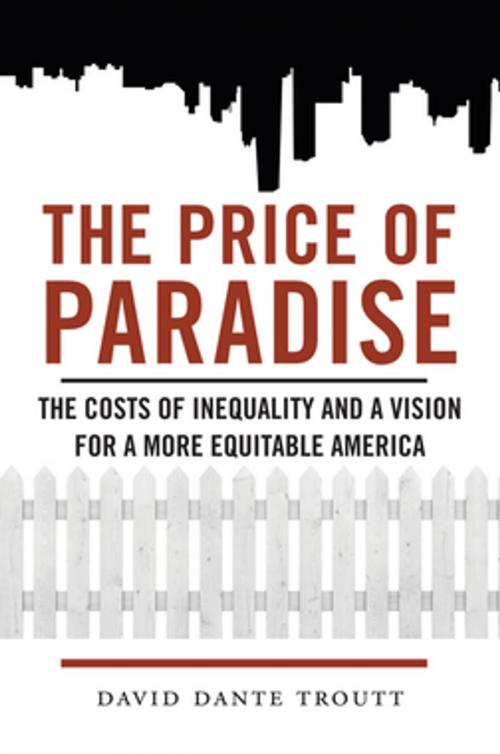The Price of Paradise
The Costs of Inequality and a Vision for a More Equitable America
Nonfiction, Reference & Language, Law, Social & Cultural Studies, Social Science, Sociology| Author: | David Dante Troutt | ISBN: | 9780814760987 |
| Publisher: | NYU Press | Publication: | January 17, 2014 |
| Imprint: | NYU Press | Language: | English |
| Author: | David Dante Troutt |
| ISBN: | 9780814760987 |
| Publisher: | NYU Press |
| Publication: | January 17, 2014 |
| Imprint: | NYU Press |
| Language: | English |
American communities are facing chronic problems: fiscal stress, urban decline, environmental sprawl, mass incarceration, political isolation, disproportionate foreclosures and severe public health risks. In The Price of Paradise, David Troutt argues that it is a lack of mutuality in our local decision making that has led to this looming crisis facing cities and local governments.
Arguing that there are structural flaws in the American dream, Troutt investigates the role that place plays in our thinking and how we have organized our communities to create or deny opportunity. Legal rules and policies that promoted mobility for most citizens simultaneously stifled and segregated a growing minority by race, class and—most importantly—place.
A conversation about America at the crossroads, The Price of Paradise is a multilayered exploration of the legal, economic and cultural forces that contribute to the squeeze on the middle class, the hidden dangers of growing income and wealth inequality and the literature on how growth and consumption patterns are environmentally unsustainable.
American communities are facing chronic problems: fiscal stress, urban decline, environmental sprawl, mass incarceration, political isolation, disproportionate foreclosures and severe public health risks. In The Price of Paradise, David Troutt argues that it is a lack of mutuality in our local decision making that has led to this looming crisis facing cities and local governments.
Arguing that there are structural flaws in the American dream, Troutt investigates the role that place plays in our thinking and how we have organized our communities to create or deny opportunity. Legal rules and policies that promoted mobility for most citizens simultaneously stifled and segregated a growing minority by race, class and—most importantly—place.
A conversation about America at the crossroads, The Price of Paradise is a multilayered exploration of the legal, economic and cultural forces that contribute to the squeeze on the middle class, the hidden dangers of growing income and wealth inequality and the literature on how growth and consumption patterns are environmentally unsustainable.
American communities are facing chronic problems: fiscal stress, urban decline, environmental sprawl, mass incarceration, political isolation, disproportionate foreclosures and severe public health risks. In The Price of Paradise, David Troutt argues that it is a lack of mutuality in our local decision making that has led to this looming crisis facing cities and local governments.
Arguing that there are structural flaws in the American dream, Troutt investigates the role that place plays in our thinking and how we have organized our communities to create or deny opportunity. Legal rules and policies that promoted mobility for most citizens simultaneously stifled and segregated a growing minority by race, class and—most importantly—place.
A conversation about America at the crossroads, The Price of Paradise is a multilayered exploration of the legal, economic and cultural forces that contribute to the squeeze on the middle class, the hidden dangers of growing income and wealth inequality and the literature on how growth and consumption patterns are environmentally unsustainable.
American communities are facing chronic problems: fiscal stress, urban decline, environmental sprawl, mass incarceration, political isolation, disproportionate foreclosures and severe public health risks. In The Price of Paradise, David Troutt argues that it is a lack of mutuality in our local decision making that has led to this looming crisis facing cities and local governments.
Arguing that there are structural flaws in the American dream, Troutt investigates the role that place plays in our thinking and how we have organized our communities to create or deny opportunity. Legal rules and policies that promoted mobility for most citizens simultaneously stifled and segregated a growing minority by race, class and—most importantly—place.
A conversation about America at the crossroads, The Price of Paradise is a multilayered exploration of the legal, economic and cultural forces that contribute to the squeeze on the middle class, the hidden dangers of growing income and wealth inequality and the literature on how growth and consumption patterns are environmentally unsustainable.















